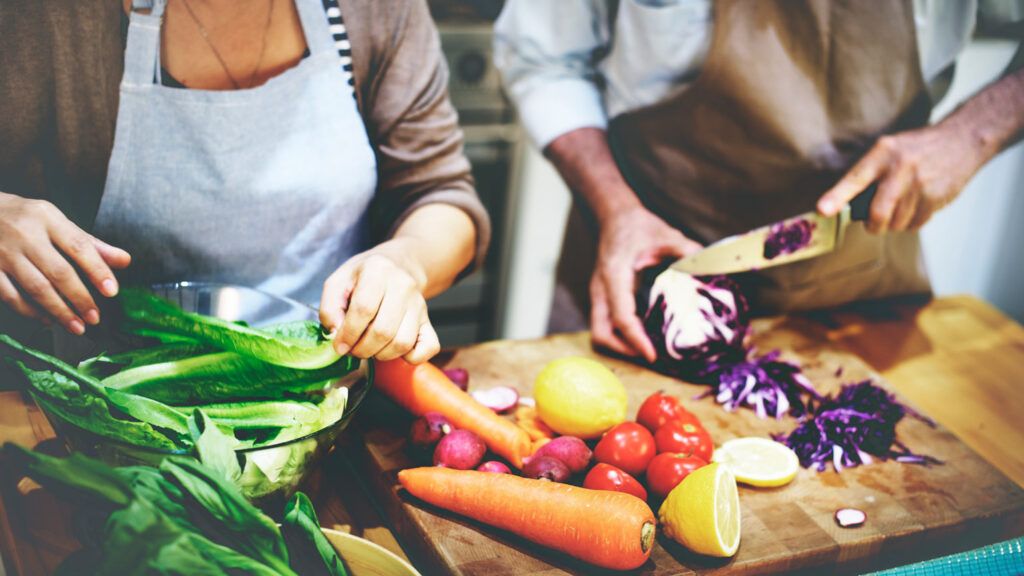Wendy Borden was a year into her fight against breast cancer when she had the idea to start her own nonprofit, Revive and Thrive.
The volunteer-based organization is a kind of Meals on Wheels delivery service for those facing life threatening illnesses like Borden did back in 2012. She had just finished a Masters program in nutrition when she was diagnosed with Stage 1 Invasive Ductal Carcinoma. Three weeks later, her mother was diagnosed with cancer. Borden moved to Grand Rapids, Michigan to take care of her while she prepared to face her own fight but nursing her mother, raising a three year old and dealing with her own treatment proved too much to handle. The first thing to suffer was her diet.
“It’s this crazy time in your life where you have tremendous need for nourishment but you have the least capacity to provide healthy meals for yourself,” Borden tells Guideposts.org. “Having a Masters in Nutrition, I knew how important, how vital nourishment was during my cancer treatment and recovery. I mean, my life depended on it and I could see myself and I was like, ‘I have got to get a program around because there really isn’t anybody else.’”
She started Revive and Thrive while going through treatment, applying for her 503c in her pajamas and reaching out to local churches, hospitals and kitchens to get the organization off the ground. She modeled her nonprofit off the Ceres Community Project in California, a similar nutrition operation she learned about in college.
Get hope for Breast Cancer here
Soon she was working out of a local church, preparing meals for patients referred to her by social workers, nurses and doctors in the area.
Fast forward a few years and Borden’s nonprofit now serves 150 meals a week to those who need it most.
The program runs every 12 to 24 weeks depending on the need of each patient, feeding as many as 25 people in that time frame. The food and delivery service is free and the only requirements are that the person be facing a life-threatening illness, be in the delivery service area and not have any food allergies.
“It’s pretty much anybody who just needs the support,” Borden says.
She meets with each patient to get a sense of what their nutrition needs are, if the program is a good fit for them and how long they’ll need help. Then, she gets to work.
Each patient gets four entrees, a quart of soup, two salads and a healthy dessert for the week, leaving two days for them to cook on their own.
“We find that a lot of our clients say that our entrees are really huge, especially if you’re not feeling well and they’re actually freezing a lot of it,” Borden explains. “There’s room for if somebody does bring you a meal or you want to make something yourself.”
Meals are prepared and delivered every Wednesday by a group of 35 volunteers or “delivery angels” but meal prep and planning the menus happens throughout the week. One aspect of the program Borden is most proud of is the inclusion of the younger generation.
A group of teens from the area come in after school to help volunteers cook the food that will ultimately feed their clients.
“Serving meals to patients is equally important as teaching these teens to cook healthy foods, to learn healthy eating and cooking skills, leadership development, job skills, life skills and really the joy of being able to serve others in their community,” Borden says.
She works with a head chef who creates the nutrient-rich meals – think kale salads, quinoa bowls and fresh fruits – before going over the menu to make sure each meal contains the essential vitamins and proteins that a person fighting a life-threatening illness might need. The organization also works with local farmers and suppliers in the Grand Rapids area, ensuring that most of their ingredients are locally grown, hormone and chemical free. The containers they use to ship the food are made of biodegradable paper, also from a local company.
“Our whole philosophy here is that every bite counts so if they’re only getting in three bites that day – I want it to count,” Borden says. “It doesn’t need to have any fillers and additives. They’re getting enough chemicals in their bodies from chemo and other treatments and medications and so we want our food to be as nourishing as possible.”
Borden hopes to move to a bigger kitchen and provide even more meals to people in the future, but right now, she’s happy to be helping those in need.
“One of my favorite quotes from a client, she said ‘When you’re alone and dealing with cancer it can exacerbate depression and fatigue. And knowing that somebody cares about what I eat, let alone how well I eat is incredible inspiring.’ That’s what it’s all about.”






